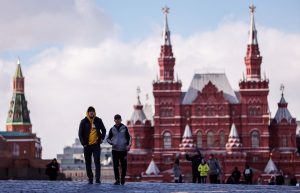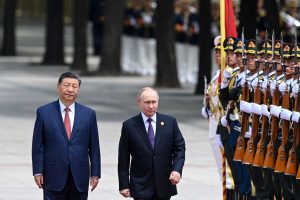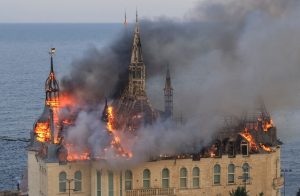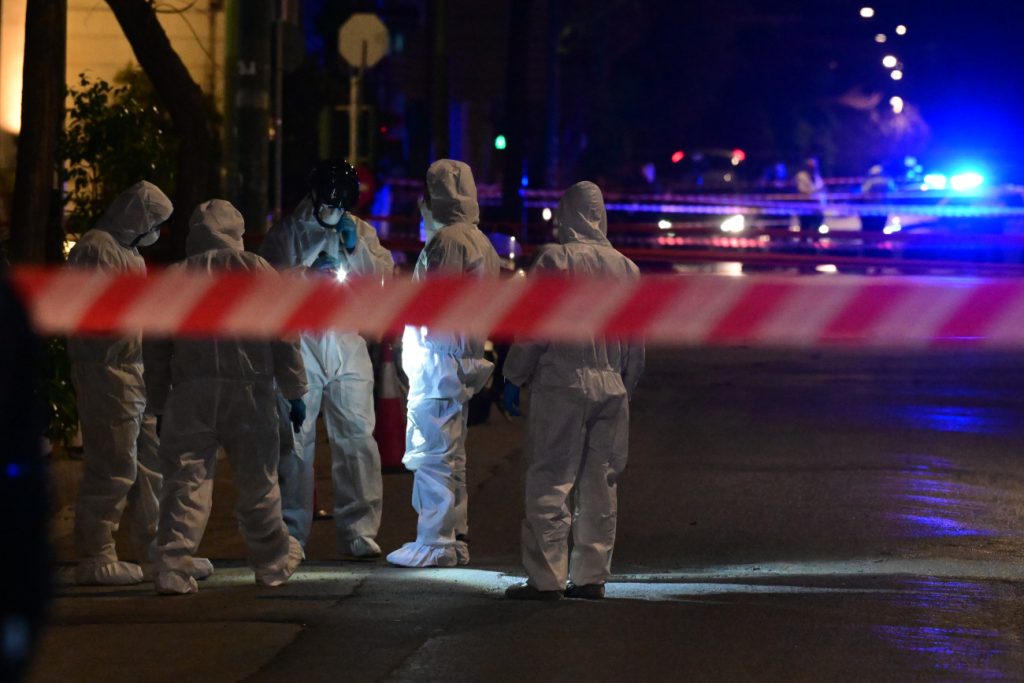When TV broadcasters in Europe came up with the idea for Eurovision, the kitschy pan-continental song contest , it wasn’t long before the Soviet bloc came up with one of their own. The Intervision Song Contest ran from 1965 to 1968 and again from 1977 to 1980, usually in Poland and sometimes attracting the occasional act from the West.
Later this year Russia plans to revive the contest—but this time there won’t be any Western performers.
Invitations have been extended to its old Soviet neighbors in Central Asia and new allies, including the organizations from its partners among the other Brics nations—Brazil, India, China, South Africa and a smattering of developing countries.
Something similar is happening in sports. Barred from competing in this year’s summer Olympics in Paris, Russia is planning to host its own World Friendship Games. Originally planned for September, the event might be pushed back, the state news agency TASS reported on Friday. More than 130 countries have expressed an interest in taking part, the agency said last month. Microsoft , meanwhile, warned this month that pro-Russian groups and individuals were using AI-generated content to disparage the Olympic Games in a fake documentary titled “Olympics Has Fallen” and spreading disinformation to heighten fears about possible terrorist attacks in France.
These are telling developments. Since Russia invaded Ukraine two years ago, the bifurcation in sports, entertainment and culture that followed is approaching the boycotts and embargoes of the Cold War—and Russian leader Vladimir Putin would prefer it that way.
He still describes Ukraine’s government as being riddled with Nazis. His propaganda chiefs accuse Ukrainian forces of killing their own people and blaming Russians. Ukrainians living in areas now under Moscow’s control are usually described as welcoming Russian soldiers as liberators.
But as the war drags on into its third year, the Kremlin is now more likely to blame the U.S. and its allies in Europe for its problems as the propaganda flow grows louder, fiercer and increasingly outlandish. The message of these cultural and sports events for both Russians and the rest of the world is, simply: We don’t need you any more .
“There’s been a shift away from Ukrainians to the West,” said Diane Nemec Ignashev, professor emeritus at Carleton College, in Northfield, Minn., who has researched and taught Russian media culture for over four decades. “The Ukrainian line doesn’t sell well. It was good for short-term use, but [Russians] have too many connections to Ukraine.”
So now, as the Kremlin sees it, all its problems can be traced back to the West.
Last October, when a mob attacked an airport in the Russian republic of Dagestan in anticipation of a flight arriving from Israel, Putin told his people that Western actors had orchestrated the chaos in an attempt to stir up anti-Jewish sentiment inside Russia and cause instability.
When Tajik militants killed more than 140 people at a concert hall near Moscow in March—an assault U.S. officials attributed to Islamic State—Russian authorities rushed to convince their population that Ukraine helped execute the assault and that Kyiv’s Western backers were the masterminds behind it.
Now Moscow is trying to persuade its people that the North Atlantic Treaty Organization is readying to unleash a nuclear strike on Russia that will trigger World War III. The head of the Federal Security Service’s border division told state news agency RIA Novosti that NATO is working on scenarios for when it would launch a nuclear strike on Russia. Putin himself regularly warned that a full-scale conflict with the U.S. and its allies is possible, describing the West as “satanic” and accusing it of abandoning what he called “moral norms” as it tries to force its values on Russia and other nations.
He has now gone full-bore into nurturing close relationships with a host of countries that share his wariness of the U.S. and its partners, mostly notably China, which has provided a lifeline to the sanctions-stricken Russian economy, Iran which has supplied missiles and drones, and North Korea, which has sent Moscow ammunition and other weapons. In Africa, Putin’s efforts to cast himself as a defender of traditional religious values have won him admirers across a slice of nations that used to look to the West. During a tour to the Middle East in December, Putin’s media team worked hard to show him being embraced by influential Arab nations.
At home, television celebrities, athletes, writers and musicians have been drawn into the public-relations campaign to spread the message that the West is the source of all Russia’s ills.
Faced with entry restrictions from many previously prized Western destinations, Russians are being encouraged to venture elsewhere. A new travel show called “The Lives of Others” showcases what are billed as more favorable locations for Russians, including China, Brazil and Sri Lanka.
Others encourage Russians to look inward and applaud the country’s strengths.
A show called “Nashi,” or Ours, explores what the presenters describe as the “positive changes” that have touched the lives of people living in the Ukrainian territories now occupied by Russia, including the opportunity to vote in last March’s Russian presidential election. “In liberated Avdiivka they told us: First, give us bread, and second, let us vote for Putin,” Margarita Simonyan , the head of the Russian state broadcaster RT and a key Putin propagandist, said in a monologue on social media the day after the vote.
“The machine today is full spectrum, 24-7 nonstop propaganda,” said Ian Garner, at Queen’s University in Ontario, who focuses on Russian culture and war propaganda. “That means celebrity culture, pop culture, reality TV shows, news discussions, broadcast media, digital media, school textbooks. You name it, it is propagandized by the state,” he said.
Analysts who follow Russia say it is working. Putin has silenced nearly all his critics, and with most independent media blocked or banned, Russians are turning to carefully controlled state television channels.
“It is about prolonging the regime…reducing resistance against Putin and his gang, who now have a hold on power,” said Joanna Szostek, an associate fellow at Chatham House who lectures on political communication at the University of Glasgow. “The propaganda in conjunction with the repression is extremely effective.”
The song contest, Intervision, appears to hold a particular significance for Putin’s government.
Russia had thrown a lot of resources into competing at Eurovision, which is perhaps known in the U.S. for its popularity among the LGBT community and for the Will Ferrell-Rachel McAdams spoof film, “Eurovision Song Contest: The Story of Fire Saga.”
After years of trying, Russia won in 2008 with a song performed by Dima Bilan. It seemed like a breakthrough moment for the country, which at the time was pursuing closer relations with Europe.
Five years later, things turned ugly when Russian Foreign Minister Sergei Lavrov said that votes that should have gone to the Russian contestant, Dina Garipova, had been “stolen.” She received no votes at all from Azerbaijan despite coming second in the Azeri telephone poll. Lavrov vowed that “this outrageous action will not remain without a response.”
Azerbaijan, which tries to maintain good relations with Moscow, promised a full investigation.
In 2022, Russia was barred from Eurovision , which Ukraine won, and Moscow began looking for a new path.
Its solution was to revive Intervision, which it announced the following year. Putin promoted the contest during his trip to China in May, describing it as a new way for Russia and its allies to interact, TASS reported. Lavrov talked up the contest in a meeting with his Bolivian counterpart in April.
One crucial difference with Eurovision: While the European contest tends to involve songs performed in English, contestants in Intervision will be encouraged to use their national languages. Mikhail Shvydkoy, Russia’s presidential envoy for international cultural cooperation, last year told the state news outlet Izvestia this was a reflection of “the multipolar world in which this competition will be held.”
The contest is scheduled to take place in the fall, with 15 countries slated to take part, which, besides some of the Brics nations and former Soviet states in Central Asia, could include Pakistan, Serbia, Bolivia and Cuba, among others.
Write to Ann M. Simmons at ann.simmons@wsj.com








